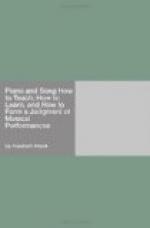But I see among my audience several beginners in singing, and I beg to be allowed a word to them. So long as many of our German song composers consider it beneath their dignity to study the art of singing in the old Italian master-works, and under the guidance of well-qualified singing masters,—as Gluck, Naumann, Hasse, Haendel, Haydn, Mozart, Salieri, Winter, and others have done,—I warn you to take care of your tender voices, which are so easily ruined, and not to allow yourselves to be misled by ingenious opinions, and by music otherwise good. The loss of your voices follows in the footsteps of modern tortures in singing, as you may see sufficiently in all our theatres, or, indeed, may experience yourselves in numberless German songs. Apply also to singing what I have just said about piano-playing: as you should choose for the piano music suited to the piano, so for your studies in singing select only that which is adapted to the voice; under the guidance of prudent and educated teachers, not of modern voice breakers, who allow you to scream, “in order to bring out the voice.” When you have acquired a good technique, when your attack is sure, and a certain skilfulness in singing has been developed, then only you may try, by way of experiment, a few pieces of such spirited but unskilled song composers, who frequently commit sins in every line against correct representation, the register of the voice, the breathings, the pronunciation, and a hundred other things.
Look around and see who sing these so-called classical songs. They are either singers who do not know what singing is, and who have no taste for it, which, in consequence of their education, they never can have; or those who no longer have any voice, and accordingly sing every thing, or, rather, declaim it, because they cannot sing. I recommend you to sing (to mention the names of two only of our most excellent song composers) the charming songs of Fr. Schubert and Mendelssohn, who, in constant intercourse with the most judicious masters of singing in Vienna and Italy, have striven constantly to compose scientifically, and have at the same time produced clever songs; but you should sing them not too often, or too many of them. Singing in the German language, and in syllables, and often with clumsy melodies, requires a great deal of voice, and easily leads to many faults and to a false manner. Remember how strictly Jenny Lind selected, for performance in her concerts, the songs of Schubert, Mendelssohn, and Schumann. In this way she succeeded in winning great success, even with small, short songs.




